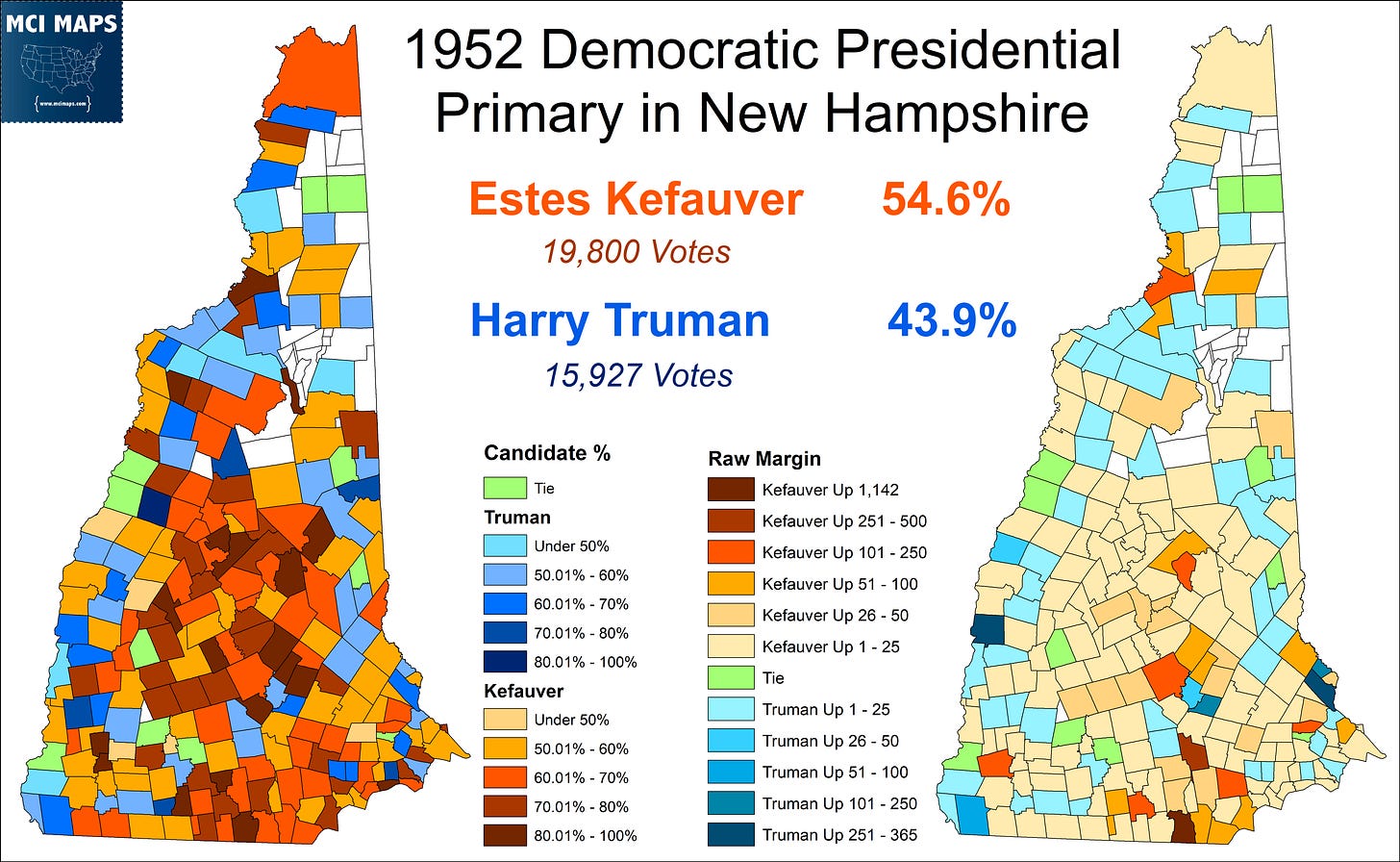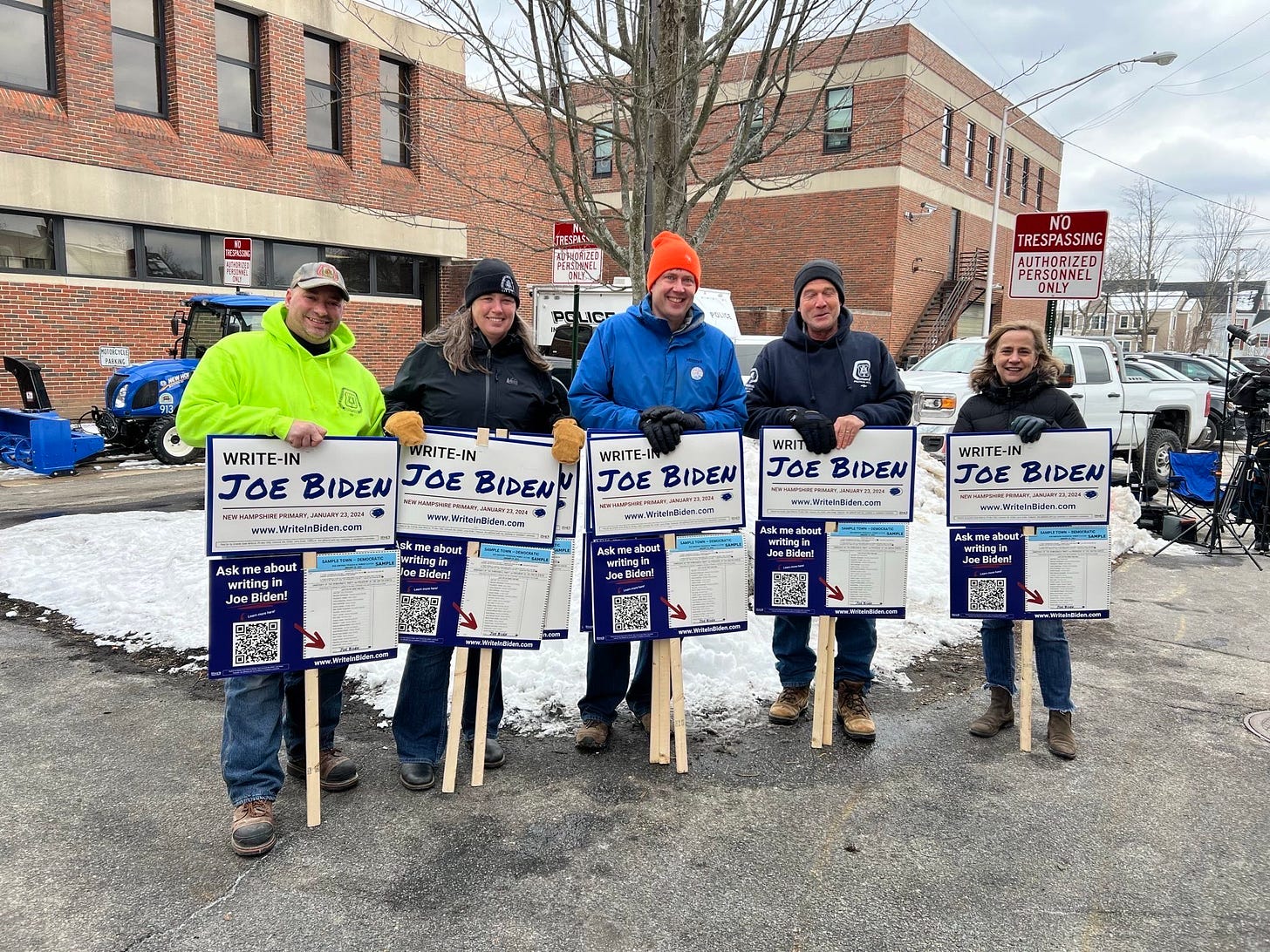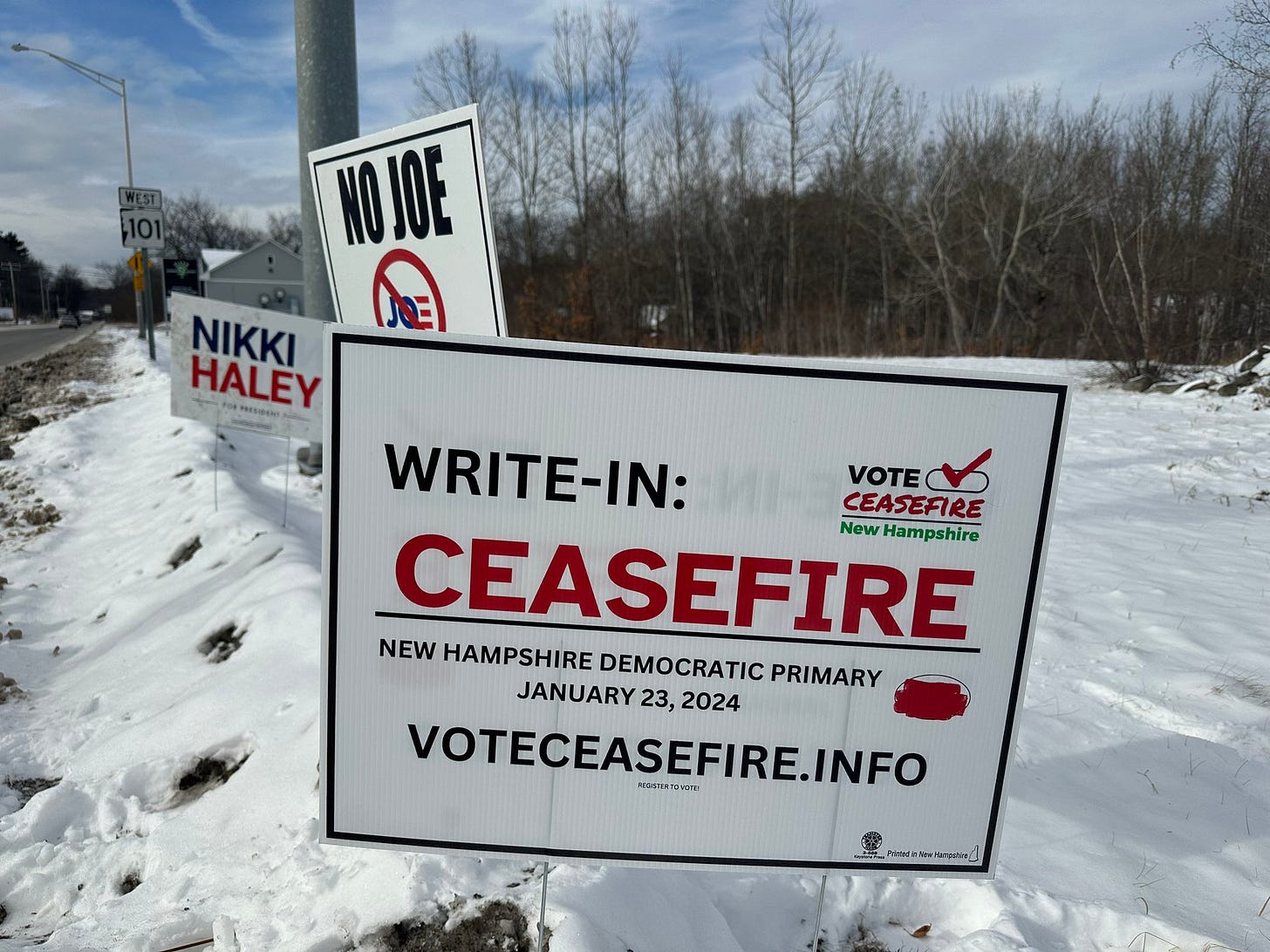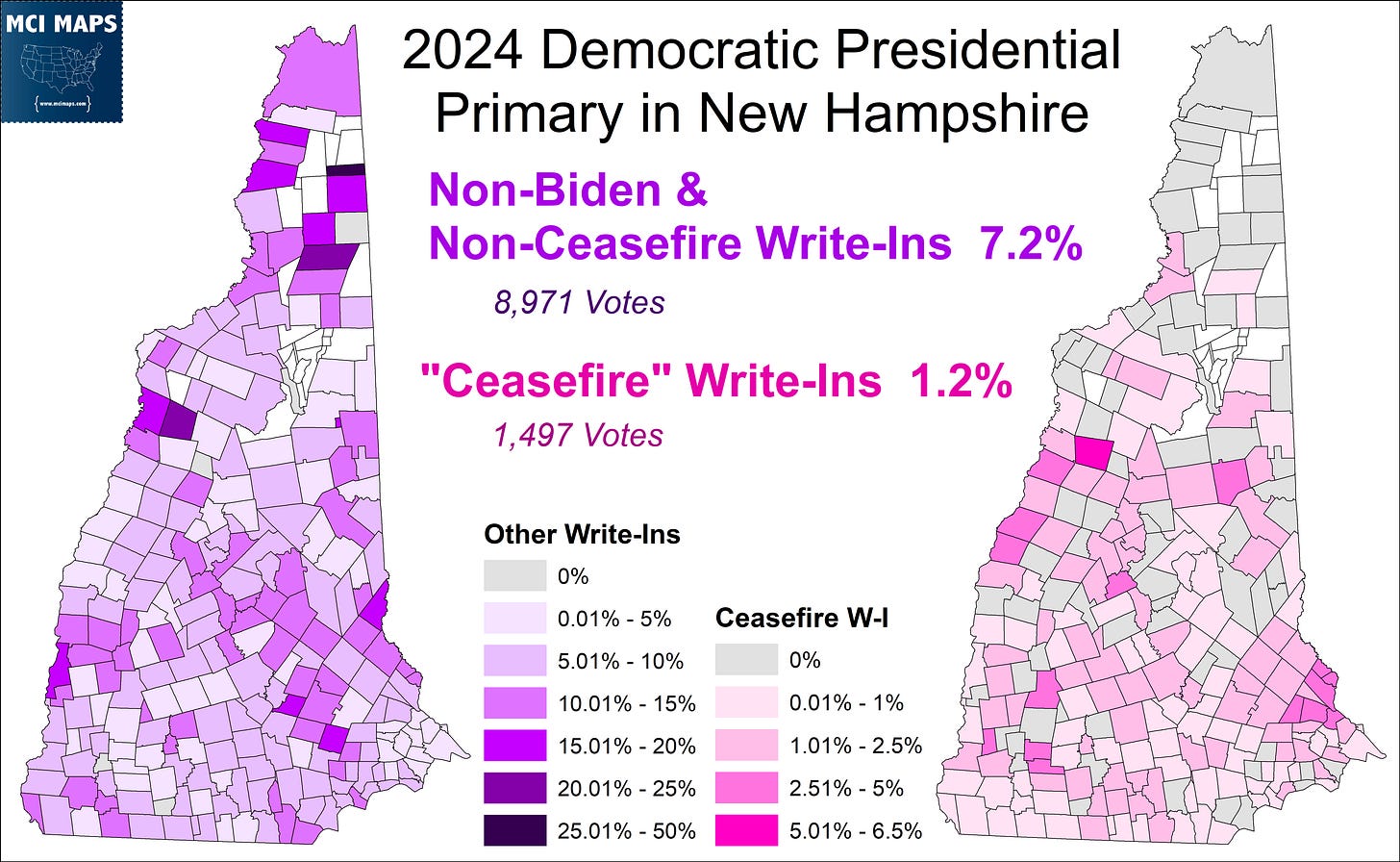Issue #152: How Biden Won the New Hampshire Primary as a Write-In
The Infamous 1st in the Nation Primary
On Tuesday, national news and most political watchers honed in the New Hampshire Republican Presidential Primary. That night, Donald Trump defeated Nikki Haley by 11 points. The win, which follows his Iowa Caucus win from last week, further cements him as the inevitable GOP nominee.
However, the GOP primary is not my main focus today. Instead, I wanted to talk about the Democratic Primary. Normally a primary for the party who’s incumbent President is running for re-election is not interesting. This time, however, it was interesting, because Joe Biden was “technically” not on the ballot.
For this newsletter I wanted to look at why that was, the feud between the state and the DNC, and the long-shot bid of Congressman Dean Phillips.
1st in the Nation - By Law
Anyone who follows politics even to a small degree knows about New Hampshire and its place as the “1st in the Nation Primary.” Every Presidential cycle, like clockwork, sees Iowa hold its caucuses first, following by New Hampshire’s primary. If you want a refresher on why caucuses and primaries are different, read my look back at 2016 and how caucuses and primaries can yield different results.
New Hampshire’s instance at holding its primary first in the nation is not just a matter of state stubbornness, its actually engrained in their laws. In the 1950s and 1960s, New Hampshire was one of just a handful of states to hold a Presidential Primary; as the practice did not become widespread until the 1970s. While it was voting first on the calendar, there was nothing yet in the law that mandated that. This changed in 1975.
The events around the 1975 law were shaped by national events. The 1972 Democratic Primary had been an especially nasty affair, with politicians of the time lamenting that the fight between Edmund Muskie and George McGovern. Muskie would win the contest, but the result left a bitter taste in many mouths due to the contentious fight and hurt feelings when it was done.
Don’t forget it was during this primary that the Manchester Union-Leader published a forged letter claiming Muskie mocked French Canadians; and subsequently made unfavorable reports on his wife’s personal matters. Muskie’s Press Conference in front of the paper led to claims he was crying (likely actually snow melting) - a moment that led to his weaker-than-expected win and the unraveling of his campaign. Many New Hampshire citizens did not like their state being at the center of such controversy.
On top of this, the collective burnout of Watergate led to a goal of shortening primary calendars. The idea of a “New England” primary date, where all of the region voted the same day, was being floated. However, at this point many New Hampshire politicians saw the benefit of the state being 1st in the line in previous years. The idea to engrained this into law formed. That year, State Rep James Splaine guided the legislation that set New Hampshire has having its primary at least 7 days before any other state attempting such a contest. The law also empowered the Secretary of State to set the date; thus keeping the legislature from having to approve date changes cycle by cycle. After this, from 1976 and onward, New Hampshire wasn’t first first by tradition, but by law.
Resistance to Reform
Nothing will get you into a first-fight in New Hampshire like claiming their primary date should be changed. The state is fiercely protective of their place; often touting their large non-affiliated voter population, which can vote in either Democratic or Republican contest; and potentially aid the parties in seeing who is viable with independents. However, the state’s preference has face criticism within Democratic circles because its lily-white demographics don’t match well with the parties diverse ethnic coalition.
The push against New Hampshire’s place has existed in some form for years within Democratic circles. On top of that, other states have tried to jockey for more relevance. Under the guiding of Harry Reid, Nevada tried several times to jump earlier in the calendar; as far back as 2012. New Hampshire, however, would always promise to move 7 days ahead. The state was aided by its longtime Secretary of State Bill Gardner, a conservative Democrat, promoting himself as the most hardened defender of the primary law. Gardner would retire in 2022, but his successor, David Scanlan, keeps up that fight.
While this has been an emerging issue for some time, it hit fever pitches in 2016 and 2020. In both years, Iowa and New Hampshire both seemed to not have their pulses on the Democratic electorate. Eventual nominees Hillary Clinton and Joe Biden struggled in the earlier contests, especially Biden, but then swept the nomination away in more diverse states. This article of mine from 2016 highlights an important role of black voters in the primary.
In 2020, New Hampshire felt especially out of touch, as Joe Biden got just 8% of the vote in the primary; but would eventually take the nomination.
Biden’s primary campaign was jump-started in the heavily-black South Carolina Primary. However, even before this, Iowa and Nevada precinct data had shown Biden was still the favorite of black voters. However, such a core demographic didn’t really get to have its weight felt until that South Carolina. The results renewed questions about how representative of the Democratic electorate Iowa and New Hampshire were.
The complaints led to changes within the DNC. In 2023, the party announced its new primary calendar proposal. The agreed early calendar was to be…
February 3rd - South Carolina
February 6th - New Hampshire and Nevada
February 13th - Georgia
February 27th - Michigan
The DNC goal was added diversity in the calendar but also honor New Hampshire with an early slot. Iowa, who’s 2020 caucus was an absolute mess, would not have a prime slot early in the calendar.
As you can expect, New Hampshire told the DNC to buzz off, pledging to keep its 1st in the Nation plans. However, as a result, and showing solidarity with the DNC, Biden declined to submit formal candidate paperwork for the primary contest. He was therefor not on the ballot.
However, Biden could always be written-in, and as I will discuss further, an effort to write-in the President did emerge. However, one notable Democratic candidate did announce for New Hampshire; Minnesota Congressman Dean Phillips.
The Ghosts of Truman and Johnson
Congressman Dean Phillips is running a longshot, but really its a dead-on-arrival, primary against Biden. I will not delve into the specifics, as to me it comes off clearly as a vanity delusion. Phillips spent much of 2023 complaining about Biden’s age as a reason to get in. On the trail, he has adopted positions all over the spectrum, and complained endlessly about his lack of coverage or ballot access. Phillips has gone increasingly unhinged as his bid, which has been funded by conservative business interests, goes on. Recently Phillips complained the DNC had a cult of personality around Biden. As if this is the politburo or something.
So did Phillips have a shot in New Hampshire? Well it wouldn’t be the first time an Incumbent saw a bad showing in their primary. Two examples especially stand out; those of Harry Truman and Lyndon Johnson. Both had bad nights in New Hampshire and subsequently ended their campaigns afterward. Now in both instances neither were openly campaigning; and there is debate if either really intended to run again anyway. That said, the insurgencies against them are very notable.
In 1952, to start, we saw that Harry Truman actually LOST the Democratic Primary in New Hampshire to Tennessee Senator Estes Kefauver.
Truman was facing a horrible prospect heading into 1952, with a struggling economy and dragged out Korean War leading to the President holding approvals in the 20s. Kefauver had been campaigning for the post by offering a fresh perspective. With his win here, Truman would drop out. However, in an era where primaries were rare, the eventually nominee was Adlai Stevenson.
The next example was 1968 and Lyndon Johnson. Here, a Johnson write-in campaign only secured an 8 point win over Eugene McCarthy, an anti-war Senator. The results reflected the unpopularity of the Vietnam War within Democratic ranks.
This weak win was the final straw for Johnson, who weeks later made his intention to not run clear. Again there is evidence Johnson likely was going to call it quits anyway. However, if there was any doubt, this ended that. It also likely fueled Johnson’s decision to announce when he did, as it then was his focus to ensure his VP, Hubert Humphry, get the nomination. The weak win also sparked Robert Kennedy to formally jump in the primaries.
Congressman Dean Phillips clearly hoped for a strong New Hampshire showing to perhaps force Biden to consider ending his re-election. For Phillips, the fact Biden could only be a write-in, coupled with anger at the DNC, and the fact the contest would formally be for no delegates, New Hampshire was definitely his best shot.
The Campaign and Results
The campaign in New Hampshire, at least from the Biden camp, was awkward and formally non-existent. The DNC made it clear the primary would not count toward delegates; declaring the results “meaningless.” This led to repudiation by Democrats and Republicans in the state.
Biden was more diplomatic, stating
“While the president wishes to participate in the Primary, he is obligated as a Democratic candidate for President to comply [with party rules],”
While Congressman Phillips continued to try and take advantage of the DNC rivalry, he also got bad coverage for removing Diversity, Equity, and Inclusion statements from his website after an anti-DEI businessman Bill Ackman donated $1 million to his Super PAC. While many voters were angry with the DNC, Phillips had issues that made it difficult to consolidate that anger.
While Biden was not on the ballot, the possibility to write him in was always present. As a result, prominent New Hampshire Democratic leaders launched a write-in effort for Biden. This wasn’t just a small effort either. Prominent Democrats across the state donated to the effort and advocated for writing in the President. The anger at the primary calendar was directed toward the DNC, with Biden not taking the brunt of the controversy. On election day, polling sites were filled with write-in Biden signs, and by that point a great deal of press coverage had been given to the push.
This was not the only write-in effort, however. Another campaign was launched for voters to write-in “ceasefire.” This, if you have been living under a rock for 3 months, revolves around the ongoing war in Gaza. Activists angry with Biden for not demanding a ceasefire toward Israel launched a late effort for this campaign.
Normally, write-in votes for non-real people do not get counted in New Hampshire. However, the New Hampshire Secretary of State did announce “ceasefire” would be counted since it reflected an organized effort. In response, “Democratic Majority for Israel PC” sent a letter to the SOS (see here) protesting that decision. It did not go anywhere and honestly likely gave the move more coverage.
So heading into election day, analysists and pundits would be watching how Dean Phillips did, how the write-in effort for Biden did, and how the “ceasefire” resolution would do. Results would be slow to come in, as write-ins would take additional time to allocate properly. However, even quick into the night it became clear Biden had secured a solid win.
The final results gave Joe Biden 64% of the vote. Phillips, who close to the end of the campaign said that 20-25% would justify him staying in (image me rolling my eyes), got 19.6% of the vote. FYI he has not dropped out as of this writing.
I have some town maps below, note that the town of Landaff has not separated out its write-ins so its not included in the maps, and Salem did not break down the non-Biden write-ins, so those are lumped together with no ceasefire breakdown. In addition, some towns are correcting results and these are not final yet; so consider the raw votes to have a margin of error.
First lets look at Biden vs Phillips, his biggest opponent. Biden won all but one town, Hill, which had 77 total votes and was a 1-vote difference.
A handful of the small rural towns also remained close, but then the bottom quickly fell out for the Congressman. Biden absolutely crushed Phillips in major towns and cities. Phillips lowered his expectations at the end of the campaign, but he clearly wanted a higher showing than this.
There were a litany of rando candidates on the ballot, which I have largely lumped together. Marianne Williamson, the self-help guru who ran in 2020 from the far-left, secured 4%. The next candidate was down at 1.3%. Williamson has been running for some time, aiming to go to Biden’s left. However, she has failed to gain traction through the entire process.
Williamson was largely under 5% in most towns. Her best showing was Windsor, which has 7 votes. There she got 2, Phillips got 1, and Biden got 3.
So how did the “Ceasefire” effort do? Well if you watched twitter (or X, whatever) on election night, you may have seen many of its advocates misunderstand the write-in reporting. Ideas that ceasefire got 15% of the vote floated around. In reality, final data in, “ceasefire” got 1.2%, just under 1,500 ballots.
A vast majority of the write-in votes that were not for Biden were for other people. Nikki Haley got almost 4,700 write-in ballots, for context. Ceasefire only topped 5% in the small town of Warren. One if its better showing was 4% in Durham, a college town. However, this is still far less than activists desired.
Final Thoughts
For some time in 2023, Democratic officials did worry about what New Hampshire would look like. The lack of Biden on the ballot, coupled with local anger at the DNC, led to some to worry about an embarrassing protest vote. Congressman Phillips was clearly the best positioned to take advantage of this. However, the Biden write-in campaign is largely being heralded as a success, with focus remaining on the GOP side of things.
On the Democratic side, the first authorized primary will be a week from Saturday, February 3rd, in South Carolina. No one expects anything other than a Biden landslide.













